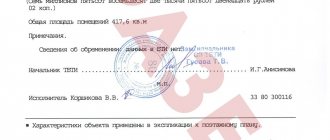A certificate of paternity can be obtained exclusively at the registry office in person. The document is printed on a special form and then certified with a stamp. To issue such a certificate, you will have to pay a state fee, the amount of which is described below. The information provided will allow you to find out where to go to obtain a document and whether the registry office can refuse to issue a document. Instructions are provided for restoring a lost or damaged certificate.
Remember that the document can be canceled. To do this, you must have concrete evidence that the man is not the father. And then the court makes a positive decision to revoke the validity of the certificate.
Document appearance - sample
Sample
Certificate of Paternity Establishment is a special form with a high degree of security: watermarks, etc. It contains the following information:
- name of the form;
- detailed information about the child: full name, date of birth, etc.;
- Full name of parents;
- Full name of the child to establish paternity;
- record of document issuance;
- official seal and signature of an authorized person.
Each certificate has an individual, non-repeating number and series.
Legislation
The basis of Russian legislation regulating issues of recognition of paternity is the Family Code. In particular, Chapter 10 of the RF IC establishes the rules and features of determining the origin of children, the general procedure for recognizing paternity and the process of establishing it through the court, the procedure for making an entry about parents in the birth register, issues of challenging paternity and other fundamental issues relating to the origin of a child.
The procedural aspects of determining the origin of the baby are described in the Federal Law of November 15, 1997 No. 143 “On Acts of Civil Status”. In particular, Chapter VI of the law establishes the grounds for determining the father of a child, the obligation of state registration of paternity, the specifics of the procedure, cases when establishing the origin will be refused, as well as the procedure for issuing and contents of documents confirming the origin of the child.
Who can stand for the issuance of a certificate
The biological father is not the only person who can stand to issue a certificate. The following person (several persons) can receive the document:
- both parents, going to the registry office at the place of registration;
- the child’s father, if the mother died prematurely, is absent from her place of registration or is considered missing;
- guardian or person who cares for the child. The certificate can be received by both an individual and a legal entity;
- a child who has reached the age of majority.
Other persons wishing to issue this document will be refused.
Can they refuse?
If all the requirements of the law regarding the procedure, application and documents attached to it have been met, then, according to Art. 53 of the mentioned law, the refusal of the civil registry office to issue a certificate can be due to only one circumstance - the presence in the book of records of information about the child’s father (entered there not from the words of the mother, but for other reasons). That is, we are talking about the confirmed fact of recognition of another man as the father of the child.
In this case, new data about the father can be entered only by court decision: based on the results of challenging the paternity of another man and the parallel recognition of the applicant as the father.
In some cases, only the father of the child receives a certificate
In frequent situations, the father independently applies for a document, without the participation of the mother. This action is possible only in certain cases:
- premature death of mother;
- the woman’s absence from her place of registration, lack of information about her current location;
- mother's incapacity;
- restriction or deprivation of a woman's parental rights.
A man can apply for and receive a certificate of paternity in cases where the woman cannot give her actual consent or her decision is not legally binding.
What you need to have with you:
- identification document - passport (original and photocopy);
- a document or certificate confirming the mother’s inability to be present when submitting the application;
- certificate of approval of the action by the guardianship authorities (if the child is under 18 years of age);
- child's birth certificate.
The period for receiving the document is from 1 to 3 working days.
Who can apply for a certificate
The right to apply to government bodies to establish paternity and, accordingly, to issue and receive a certificate, has only a limited circle of persons established by Articles 48-49 of the RF IC. According to them, this right is vested in:
- the child’s parents who have not formalized their marriage;
- the father of the child, if his mother is declared missing, deprived of parental rights, died or her whereabouts cannot be determined;
- any of the parents, if the origin of the child is established through the court;
- the child's guardian or trustee;
- a breadwinner who has a dependent child;
- son or daughter after they reach 18 years of age.
It should be taken into account that for these subjects there is no uniform procedure for applying to establish paternity. Moreover, many of them receive this right only in exceptional circumstances.
Establishing paternity in court
In controversial situations, a man can initiate obtaining a document recognizing paternity in court:
- the child's mother does not recognize the man's paternity;
- the father does not recognize the child;
- upon the death of the mother or deprivation of her parental rights.
Having familiarized themselves with the situation, authorized persons, based on the presented arguments, certificates and documents, will decide whether there is a need to recognize the man as the father of the child. If the request is granted, the man needs to contact the registry office at his place of residence and apply for a document.
The court decision will contain all the necessary information, so the man will only need to have a passport with him, and also pre-pay the state fee.
How and where to get it?
How and where to get it? You should contact the registry office. Other government agencies are not authorized to issue this certificate.
Read also: How not to pay alimony legally?
Those wishing to receive the document should have with them:
- documents for identification of parents;
- children's documents (if any);
- a receipt confirming that payment of the state duty has been made;
- consent of the child if he is over eighteen years old;
- permission from guardianship and guardianship authorities at the request of a judge;
- a document that confirms that the father has the right to submit an application himself (if necessary);
- court decision (if any);
- identification document of the legal representative and his power of attorney.
It is important to understand that not all people can apply for a document. The document may be issued to the following citizens:
- the child’s parents, if they are not officially married;
- to the baby’s father personally (if the mother is incompetent, died, disappeared or was deprived of parental rights) with a permitting document;
- the legal representative of the minor;
- guardian;
- trustee;
- adult (by court decision).
The application must be submitted to the registry office employee personally in writing. It should be filled out on a form according to the sample issued by the Civil Registry Office. On this page you can submit statements from your parents, father, or an application based on a court decision. These three forms have some differences that are important to be aware of.
The completed application must be taken to the registry office at the place of residence of the parents (or father) or at the place of registration of the baby. The above documents are also attached to it. Next, the civil registry office staff checks the documentation provided and then issues (or refuses to issue) the document. Issue is made on the day of application, so you won’t have to wait long.
When can a document be refused?
An application for a certificate of paternity is accepted if the registration journal at the registry office does not contain this data or they need to be updated. If the child has a father and this is recorded in the registry, then permission to file an application will need to be sought in court. Correction of existing data solely from the words of the child’s mother is not valid in the absence of documentary evidence.
Paternity cannot be canceled if the child was born by a surrogate mother or IVF was performed and the man confirmed his consent in documentary form.
Registration of the certificate
The conditions under which paternity can be established depend on the specific circumstances occurring in each individual situation, in particular, the presence or absence of a dispute about paternity, recognition of the child by the father, and so on. However, the issuance of a certificate of paternity is the result of the procedure, so it is always carried out in accordance with the general procedure. Let us draw the readers' attention to the main points of obtaining it.
Where to contact
The registration of such a certificate is carried out exclusively by the registry office: at the place of residence of the parents, registration of the birth of the child, and so on. At the same time, obtain a document confirming paternity (certificate), in accordance with clause 2 of Art. 56 Federal Law of November 15, 1997 No. 143, parents or one of them can only at a personal request: civil registry office employees are not required to automatically issue a certificate.
What documents are required
As already noted, a certificate of father determination can be issued only after state registration of paternity determination. She, in turn, according to Art. 48 of the above law, is carried out on the basis of an application from the person applying for registration.
Therefore, the first document required to obtain a certificate will be an application for state registration of paternity establishment. Depending on the situation, one of three applications provided for by law may be submitted:
- joint statement of parents ();
- father statement();
- statement by court decision ().
Application forms (No. 12-14) were approved by Decree of the Government of the Russian Federation of October 31, 1998 No. 1274.
By the way, in addition to the application, other documents may be required, including:
- Identification documents of the applicant (pay attention to the validity period of the document: it will not be possible to register paternity if the passport is expired);
- child's birth certificate (if available);
- receipt of payment of state duty;
- permission of the board of trustees (if only the father submits the application);
- other documents confirming the father’s right to file an application alone (for example, a mother’s death certificate or a court decision declaring her missing);
- court decision, if recognition of paternity was carried out in court;
- consent of the child himself, if at the time of registration he became an adult.
State duty amount
As we have already noted, the procedure for establishing paternity requires the mandatory payment of a state fee, otherwise the registry office employees will refuse to register the citizen. The amount of the duty is set by paragraphs. 3 p. 1 art. 333.26 of the Tax Code of the Russian Federation, according to which it is 350 rubles. Details can be obtained from the registry office or found on the official website of the department.
Payment of the duty is carried out through the bank. The law does not oblige you to save the payment receipt and present it to the registry office employees; this is only the right of a citizen, thanks to which he can significantly speed up the procedure.
After registration
After the applicant has completed all the procedures and submitted documents, the Civil Registry Office employees check the completeness and authenticity of the submitted package of papers, after which they carry out state registration. Based on its results, the applicant is issued a certificate.
The document must be issued to the applicant on the day of application: as a rule, the procedure does not take more than an hour. If necessary and by personal agreement with the registry office employees, the certificate can be collected later, for example, the next day or a week later.
Replacement procedure
Recognition of a specific person as the father of a child gives rise to certain legal consequences and also requires the replacement of certain documents. Next, we suggest you find out whether a new birth certificate is issued after paternity is established.
If at the birth of a child his parents are not married, did not submit a joint application to register them as parents, and there is no court decision on this matter, then, according to paragraph 3 of Art. 51 of the RF IC, the father of the child in the birth record book is indicated only from the words of the mother.
In the future, when registering to establish paternity, new information about the child’s father must be entered into the birth record. According to Art. 57 Federal Law No. 143 dated November 15, 1997, the basis for their inclusion is the act of establishing paternity.
It is noteworthy that entering new data about the father will also require changing the child’s surname and patronymic. The procedure for making such an entry is determined by Art. 73 of the above law, according to which a change in personal data is the basis for issuing a new certificate of state registration of a civil status act. That is, after recognizing a man as a father, it is necessary to obtain a new birth certificate for the child.
Cancellation of paternity certificate
It is impossible to cancel a document establishing paternity on your own. This process can be initiated only on the basis of a positive court decision and nothing else. The following persons (several persons) can apply to cancel a document:
- a man listed in all certificates and documents as the father of the child;
- mother, guardians or other persons having a legally confirmed relationship with the child;
- the application was submitted by the biological father of the child in order to confirm paternity, if another man is indicated in the registry office register (DNA examination will be required);
- a child who has reached the age of majority.
To cancel a document confirming paternity, just one desire is not enough. Authorized persons must provide a reasoned reason, based on which a decision will be made to satisfy or deny the applicant’s request.
If the procedure was initiated by the mother or the child himself, it is necessary to provide documented evidence that the man fails to cope with his responsibilities, ignores them, commits acts of violence against the woman or child, etc. Most often, the procedure is not limited to just the annulment of the certificate of paternity. If the evidence provided is confirmed, the man will be limited in parental rights or deprived of them.
The man initiates the procedure if he is not the biological father of the child, but he must not know this from the very beginning, otherwise his request will be denied. The only exception is when the biological father wants to raise the child himself and wants the rights to do so.
Cancellation of a paternity certificate is an irrevocable procedure. Once the process has been completed, the document cannot be restored again. Before deciding on this measure, it is advisable to think twice, and only then apply.
Acknowledgment of paternity
As a general rule, the father of a child born to a woman in an officially registered marriage union is the latter’s husband. Relationship is confirmed by a marriage record with the mother.
If a man is not the mother’s spouse, he can be recognized as the father only through the procedure for establishing paternity. She assumes that the blood father and mother will submit a joint application to the registration authorities, in which the first recognizes himself as the father of the joint child, and the second confirms the paternity of the first and agrees to register him as a parent.
If the mother loses her legal capacity, goes missing or is deprived of parental rights, the parentage can be established at the request of the father alone, if there is the consent of the board of trustees; in the absence of such consent, through the court.
If, for one reason or another, for example, a man’s disagreement with the child’s descent from him, the mother and father cannot submit a joint application, the child’s origin can be determined through the court.








